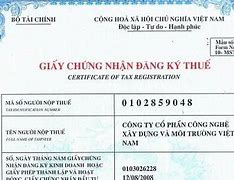
Giấy Khai Thuế Tiếng Anh Là Gì
Giấy khen tiếng Anh là certificate of merit phiên âm là səˈtɪf.ɪ.kətəvˈmer.ɪt, là ghi nhận lại thành tích của sự cố gắng của một cá nhân hay tập thể có một kết quả sứng đáng.
Giấy khen tiếng Anh là certificate of merit phiên âm là səˈtɪf.ɪ.kətəvˈmer.ɪt, là ghi nhận lại thành tích của sự cố gắng của một cá nhân hay tập thể có một kết quả sứng đáng.
Tổng cục thuế tiếng Anh là gì?
The General Department of Taxation is an organization that works under the Ministry of Finance, performing the function of advising and assisting the Minister of Finance in the state management of domestic revenues throughout the country, including taxes, fees, and charges. and other state budget revenues (hereinafter collectively referred to as taxes); and to carry out tax administration in accordance with the law.
(Tổng cục Thuế là tổ chức thuộc Bộ Tài chính, thực hiện chức năng tham mưu, giúp Bộ trưởng Bộ Tài chính quản lý nhà nước về thu nội địa trong phạm vi cả nước, bao gồm thuế, phí và lệ phí. các khoản thu khác thuộc ngân sách nhà nước (sau đây gọi chung là thuế); thực hiện quản lý thuế theo quy định của pháp luật.)
The General Department of Taxation has the following tasks and powers:
1. To submit to the Minister of Finance for further recommendation to the Government or the Prime Minister for consideration and decision on:
a) Draft laws and the National Assembly’s resolutions; draft ordinances and resolutions of the National Assembly Standing Committee; draft decrees of the Government and draft decisions of the Prime Minister on tax management;
b) Strategies, action plans, schemes, and important projects of tax administration; Annual tax-revenue estimates in accordance with the State Budget Law.
2. To submit to the Minister of Finance for consideration and decision on:
a) Draft circulars and other documents on tax administration of the General Department of Taxation;
b) Annual action plans of the General Department of Taxation.
3. To promulgate documents providing professional guidance, internal normative documents, and documents for detailed applications within the scope of its administration.
4. To organize the implementation of legal documents, strategies, master plans, plans, programs, projects, and schemes under the management of the General Department of Taxation after they are promulgated or approved by qualified authorities.
5. To propagate, disseminate, and educate about, the law in the field of administration of the General Department of Taxation.
6. To organize the tax management in accordance with the law:
a) To guide and explain tax policies of the State; to provide support for taxpayers to complete the tax payment obligation in accordance with law;
b) To instruct, direct, examine, supervise, and implement the functioning processes on tax registration, granting of tax identification numbers, tax declaration, calculation, payment, refund, deduction, exemption and reduction, and write-off of tax arrears and fines, and other relevant operations;
c) To decide on or submit to competent authorities for the decision on tax exemption, reduction, or refund, extension of the time limit for submission of tax declaration dossiers, extension of the time limit for tax payment, or write-off of tax arrears or fines.
d) To compensate taxpayers for harm; to keep secret taxpayers’ information; to certify under law taxpayers’ fulfillment of the tax obligation upon request.
đ) Make appraisals to determine taxpayers’ payable tax amounts at the request of competent state agencies.
e) To authorize agencies and organizations to directly collect certain taxes in accordance with the law.
7. To implement technical measures for risk management in tax administration activities.
8. Applying administrative measures to ensure tax law enforcement:
a) To request taxpayers to provide accounting books, invoices, documents, and other dossiers related to tax calculation and payment; to request credit institutions and other related organizations and individuals to provide documents to and coordinate with tax agencies in tax administration work.
b) To assess and retrospectively collect taxes; to apply coercive measures to execute tax-related administrative decisions for collecting tax arrears or fines for tax-related managerial offenses.
9. To compile dossiers proposing the prosecution of violators of the tax law; to publicly announce on the mass media violators of the tax law.
10. To conduct specialized tax audits; inspect and settle objections and condemnations; to handle according to its competence or propose to competent authorities for handling under law violations of the tax law; to prevent and fight corruption and negative practices, practice thrift and combat waste in the use of assigned assets and allocated funds in accordance with the law.
11. Building, deploying, and managing application software, a specialized national database on taxation, and information technology infrastructure to meet the requirements of modernizing tax administration, and internal management, and provide electronic services to assist taxpayers.
12. To organize the implementation of tax accounting, statistics, and financial statements regime as regulated.
13. To enter into international cooperation on tax as assigned or decentralized by the Minister of Finance and under law.
14. To manage its administrative instrument and payroll; to implement the salary regime and regulations and policies on remuneration, training, retraining, emulation and commendation, and disciplining of civil servants, officials, and workers under its management as decentralized by the Minister of Finance and under law.
15. To organize and supervise the tax sector’s emulation and commendation for tax agencies, taxpayers, and other organizations and individuals that record outstanding achievements in tax administration work and the performance of tax obligations towards the state budget in accordance with the law.
16. To manage funds allocated by the state budget and assigned properties, keep dossiers, documents, and tax prints according to law provisions; to implement the finance and payroll management mechanism under regulations of competent agencies.
17. To carry out managerial reform according to the objectives and contents of the administrative reform program approved by the Minister of Finance.
18. To perform other tasks and exercise other powers as assigned by the Minister of Finance and under law.
(Tổng cục Thuế thực hiện các nhiệm vụ, quyền hạn sau đây:
1. Trình Bộ trưởng Bộ Tài chính để trình cấp có thẩm quyền xem xét quyết định:
a) Các dự án luật, dự thảo nghị quyết của Quốc hội, dự án pháp lệnh, dự thảo nghị quyết của Ủy ban thường vụ Quốc hội; dự thảo nghị định của Chính phủ; dự thảo Quyết định của Thủ tướng Chính phủ về quản lý thuế;
b) Chiến lược, chương trình hành động, đề án, dự án quan trọng về quản lý thuế; Dự toán thu thuế hàng năm theo quy định của Luật ngân sách nhà nước.
2. Trình Bộ trưởng Bộ Tài chính xem xét, quyết định:
a) Dự thảo thông tư và các văn bản khác về lĩnh vực quản lý của Tổng cục Thuế;
b) Kế hoạch hoạt động hàng năm của Tổng cục Thuế.
3. Ban hành văn bản hướng dẫn chuyên môn, quy trình nghiệp vụ; văn bản quy phạm nội bộ và văn bản cá biệt thuộc phạm vi quản lý của Tổng cục Thuế.
4. Tổ chức thực hiện các văn bản quy phạm pháp luật, chiến lược, kế hoạch, chương trình, dự án, đề án thuộc phạm vi quản lý của Tổng cục Thuế sau khi được cấp có thẩm quyền ban hành hoặc phê duyệt.
5. Tuyên truyền, phổ biến, giáo dục pháp luật thuộc lĩnh vực quản lý của Tổng cục Thuế.
6. Tổ chức quản lý thuế theo quy định của pháp luật:
a) Hướng dẫn, giải thích chính sách thuế của Nhà nước; tổ chức công tác hỗ trợ người nộp thuế thực hiện nghĩa vụ nộp thuế theo quy định của pháp luật;
b) Hướng dẫn, chỉ đạo, kiểm tra, giám sát và tổ chức thực hiện quy trình nghiệp vụ về đăng ký thuế, cấp mã số thuế, kê khai thuế, tính thuế, nộp thuế, hoàn thuế, khấu trừ thuế, miễn thuế, xóa nợ tiền thuế, tiền phạt và các nghiệp vụ khác có liên quan;
c) Quyết định hoặc trình cấp có thẩm quyền quyết định việc miễn thuế, giảm thuế, hoàn thuế, gia hạn thời hạn nộp hồ sơ khai thuế, gia hạn thời hạn nộp thuế, xóa tiền nợ thuế, tiền phạt thuế;
d) Bồi thường thiệt hại cho người nộp thuế; giữ bí mật thông tin của người nộp thuế; xác nhận việc thực hiện nghĩa vụ thuế của người nộp thuế khi có đề nghị theo quy định của pháp luật;
đ) Giám định để xác định số thuế phải nộp của người nộp thuế theo yêu cầu của cơ quan nhà nước có thẩm quyền;
e) Ủy nhiệm cho các cơ quan, tổ chức trực tiếp thu một số khoản thuế theo quy định của pháp luật.
7. Tổ chức các biện pháp kỹ thuật nghiệp vụ quản lý rủi ro trong hoạt động quản lý thuế.
8. Được áp dụng các biện pháp hành chính để đảm bảo thực thi pháp luật về thuế:
a) Yêu cầu người nộp thuế cung cấp sổ kế toán, hóa đơn, chứng từ và hồ sơ tài liệu khác có liên quan đến việc tính thuế, nộp thuế; yêu cầu tổ chức tín dụng, các tổ chức và cá nhân khác có liên quan cung cấp tài liệu và phối hợp với cơ quan thuế trong công tác quản lý thuế;
b) Ấn định thuế, truy thu thuế; thực hiện các biện pháp cưỡng chế thi hành quyết định hành chính thuế để thu tiền thuế nợ, tiền phạt vi phạm hành chính thuế.
9. Lập hồ sơ kiến nghị khởi tố các tổ chức, cá nhân vi phạm pháp luật về thuế; thông báo công khai trên phương tiện thông tin đại chúng các trường hợp vi phạm pháp luật thuế.
10. Thanh tra chuyên ngành thuế; kiểm tra, giải quyết khiếu nại, tố cáo; xử lý theo thẩm quyền hoặc kiến nghị cấp có thẩm quyền xử lý theo quy định của pháp luật đối với hành vi vi phạm pháp luật thuế; phòng, chống tham nhũng, tiêu cực và thực hành tiết kiệm, chống lãng phí trong việc sử dụng tài sản, kinh phí được giao theo quy định của pháp luật.
11. Xây dựng, triển khai, quản lý phần mềm ứng dụng, cơ sở dữ liệu quốc gia chuyên ngành về thuế, hạ tầng kỹ thuật công nghệ thông tin đáp ứng yêu cầu hiện đại hóa công tác quản lý thuế, công tác quản lý nội ngành và cung cấp các dịch vụ điện tử hỗ trợ người nộp thuế.
12. Tổ chức thực hiện công tác kế toán, thống kê về thuế và chế độ báo cáo tài chính theo quy định.
13. Thực hiện nhiệm vụ hợp tác quốc tế về lĩnh vực thuế theo phân công, phân cấp của Bộ trưởng Bộ Tài chính và quy định của pháp luật.
14. Quản lý tổ chức bộ máy, biên chế; thực hiện chế độ tiền lương và các chế độ, chính sách đãi ngộ, đào tạo, bồi dưỡng, thi đua, khen thưởng, kỷ luật đối với công chức, viên chức và người lao động thuộc phạm vi quản lý của Tổng cục Thuế theo phân cấp của Bộ trưởng Bộ Tài chính và quy định của pháp luật.
15. Tổ chức thực hiện công tác thi đua, khen thưởng của ngành thuế đối với người nộp thuế, các tổ chức, cá nhân khác có thành tích xuất sắc trong công tác quản lý thuế và chấp hành nghĩa vụ thuế với ngân sách nhà nước theo quy định của pháp luật.
16. Quản lý kinh phí do ngân sách nhà nước cấp và tài sản được giao, lưu giữ hồ sơ, tài liệu, ấn chỉ thuế theo quy định của pháp luật; thực hiện cơ chế quản lý tài chính và biên chế theo quy định của cơ quan có thẩm quyền.
17. Thực hiện cải cách hành chính theo mục tiêu và nội dung chương trình cải cách hành chính được Bộ trưởng Bộ Tài chính phê duyệt.
18. Thực hiện các nhiệm vụ, quyền hạn khác do Bộ trưởng Bộ Tài chính giao và theo quy định của pháp luật.)























